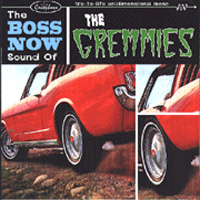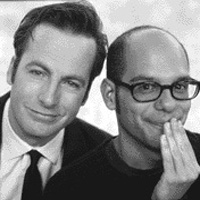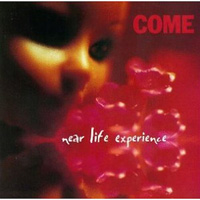 Stereolab
Stereolab
Dots and Loops (Elektra)
An interview with Laetitia Sadier
by Nik Rainey
They’re critical faves, microcosmic superstars, and bearers of the used flag of neo-retrodelia, and yet Stereolab remains miraculously untouched by self-aggrandizement and pretension. Case in point: having snagged half-an-hour of in-person one-on-one time with the Anglo-Gallic band’s main vocalist, Laetitia Sadier, hours before a sold-out show in support of their latest album, Dots and Loops (Elektra), at Boston’s Paradise club (less than a week before a couple of New England Patriots’ adventures in stagediving at, of all things, an Everclear show, led to lawsuits and forced the club to shut down for a month), Sadier, in open defiance of the conventional wisdom about both rock stars and French people, was unprepossessingly sweet-natured and even warm, quite in line with the odd but cheerful constructions for which her band is increasingly renowned. Let’s go to the tape:
The odd thing about Dots and Loops is that a lot of critics have been describing it as your most accessible album, and yet to my ears, at least, it’s probably one of the loosest in terms of song structure. What are your thoughts on that?
I personally don’t think that it’s a very accessible album, especially for the first-time listener. It won’t appeal to you on a first-listen basis, it’s something you need to listen to actively. It’s very detailed, you know, intricate. Many layers. I don’t want to say “deep” (laughs) but there’s a lot going on in it. The only reason I can think of why some people say this is that it’s our ninth album, and certain people might be used to us by now. We ask a little bit more of our listeners than most pop bands do, so maybe they did the work with our previous records, assimilated it, and now they can say they get it. I think Emperor Tomato Ketchup was a little bit more outreaching on our behalf, and now the people have to come a little way on this one. But maybe they know which way to go.
What inspired you to make the record sound this way? Obviously, having members of Tortoise and Mouse on Mars involved affected the way it came out, but was it conscious on your part?
Certainly, John (McEntire) was a big influence on the way the record sounded, the way the drums were treated, the way the instruments were recorded and so on… Personally, Tim and I have been listening to a lot of soundtrack music, Ennio Morricone and things like that, which gave us the idea to make the album a little more cinematic, bringing some ideas to the listener without them thinking, “oh, this is some pop album with some weird noises on it.” Morricone would often do some very experimental things in his soundtracks, but because of the context of the film, people would accept them and even think they were good, where they would never listen to them outside of the movie theater. So Tim tried to recreate that context in the pop format, have some strange ideas come across in a way that people would accept.
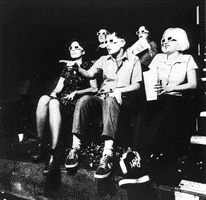 In the past, the press seemed to like approaching you from rather simplistic angles – “they’re Marxist,” “they’re a revival act,” “they’re a Marxist revival act,” etc. Has that changed noticably now that you’re a little better-known?
In the past, the press seemed to like approaching you from rather simplistic angles – “they’re Marxist,” “they’re a revival act,” “they’re a Marxist revival act,” etc. Has that changed noticably now that you’re a little better-known?
I don’t know. I doubt it – the press takes a narrow view because it’s easier for them. Much of the time, they already have the article written when they come in to talk to you, or at least they know what angle they are going to use, and they’ll remove other things that you say that don’t fit in to that, even though people would be interested to read about it. When I read the press, I like to find things that are going to open my mind a little bit, make me see the world differently somehow. Some of Beck’s interviews do that, but I can’t think of many others that do. So I don’t read the press anymore, I just let them say what they will – I can’t control it, so I do my interviews and hope that something I say comes out the way I meant it. When I do read something, it’ll often be like that piece about us in Details – that made me so mad. That guy was with us for three days, he rode on the bus with us, we talked to him about politics and philosophy and many things, and all he could write about was the carrot mustache Tim got after drinking a glass of carrot juice. It’s infuriating. It’s kind of a low expectation thing, and it sucks, because when you think about it, not many people have this outlet, this opportunity to say something and have people hear it. I do think it’s an important part of what we do, although I don’t like doing interviews for eight hours at a time like they make us do sometimes – after three hours of talking, you end up talking spaghettis.
Spaghettis?
Yeah, you’re talking and these spaghettis start coming out of your mouth (makes spiral shape with finger) and you can’t control it.
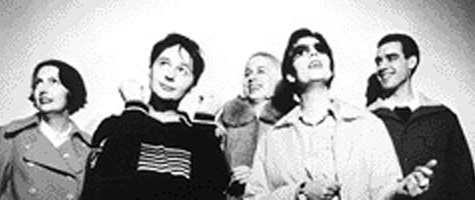 Let’s hope that comes across in print… Your rise to prominence has coincided with a wider interest in new and diverse musics. I’ve noticed in the last year particularly that there have been some marvelous, unique bands out there that don’t fit into any unified pop movement, and yet have affected the way popular music has been listened to. It seems to me that Stereolab helped kick-start that in a way.
Let’s hope that comes across in print… Your rise to prominence has coincided with a wider interest in new and diverse musics. I’ve noticed in the last year particularly that there have been some marvelous, unique bands out there that don’t fit into any unified pop movement, and yet have affected the way popular music has been listened to. It seems to me that Stereolab helped kick-start that in a way.
These are phenomenons that I really like, actually – when someone in Tokyo, someone in France, someone in London, and someone in America is getting influenced by the same things at the same time and doing something about it. They might not be aware of the others, but it’s still a collective thing, which is how movements begin. We have participated in some of these movements, or at least come along at the same time as them – elevator music, easy-listening – and all that just happens to be a part of what we do, but only a part. But a band like Throbbing Gristle, who can’t be called easy-listening (laughs), were trading on some of that kind of imagery back in 1977. And there are bands now that have those elements, yet never heard Throbbing Gristle. So it comes from somewhere.
You really seem to let the music do the talking on stage. You don’t bother with trading on your personal charisma to get the audience’s attention or erect a persona that might enhance or distract from the music.
I think we’re too sincere for that, though I understand why some people do. Sometimes, it feels like I’m just lying there onstage, and I think, “Fucking hell, where’s that persona I was supposed to come up with years ago?” It would have been easier if I had re-created myself years ago and have something I could count on in public. Also, in the realm of creation, you can pour anything you want into it. Elvis did it, PJ Harvey is doing it, even Björk – they understood what it means, the psychology of being on stage. But we’re there for different reasons; I’d rather people had control of their lives and not expect the star on stage to live their life for them. There’s the whole idea of autonomy, for people to take what they want to take, participate, give, or whatever – we don’t suck it out of the public, like “look at meeee!” They come to us, yes, but we come to them as well without being patronizing – saying “heyyy, howyuhdoin’?” and saying the same lines every night. The idea is that it circulates – a show is a success when they have given something to it, just as we have, and it creates something greater than either us or them. It changes you chemically, and puts you on some other level.
Maybe that’s what keeps you so exciting while certain other bands that use the same elements as you are already outdated. You’re not pretentious or condescending about it.
One of the things that Tim taught me was, “if you have a good idea, do it now. Don’t wait.” Don’t be afraid of using it up. Use your idea, and be confident that tomorrow, another good one will come along. And if you fail, so what? You try again. I guess that’s why so many people like us – it’s good ideas, done well, without all this seductive production or putting sexy ladies on the cover or manipulating people like that. It’s just there.
Great. Any message you want to leave the kids with before you go?
Umm… just learn how to think using your own set of reasons.
That’s a good answer. I ask other people that question and I get answers like, “play more baseball.”
Oh! Well, you can do that, too. At the same time, even.

